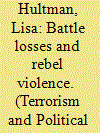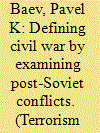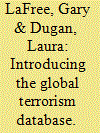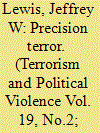|
|
|
Sort Order |
|
|
|
Items / Page
|
|
|
|
|
|
|
| Srl | Item |
| 1 |
ID:
077132


|
|
|
|
|
| Publication |
2007.
|
| Summary/Abstract |
In many armed conflicts, rebel groups deliberately target civilians. This article examines whether such violence is related to the performance of the rebels on the battlefield. It is proposed that rebel groups who are losing battles target civilians in order to impose extra costs on the government. When rebels attack civilians, the government may incur both political and military costs. Violence against civilians is thus used as an alternative conflict strategy aimed at pressuring the government into concessions. The argument is evaluated by using monthly data for rebel groups involved in armed conflict from January 2002 to December 2004.
|
|
|
|
|
|
|
|
|
|
|
|
|
|
|
|
| 2 |
ID:
077134


|
|
|
|
|
| Summary/Abstract |
Great many violent events happened during 1991-2005 in the 12 states that emerged after the collapse of the USSR but only a few civil wars are registered in the major datasets. That brings up a number of questions about the operational definitions of civil war that generally point in the direction of shifting the research attention from refining the quantitative parameters to grasping the essense of the phenomena in question. It is proposed that civil war partially overlaps with several other type of violent crisis: inter-state wars, civil unrest and revolutions, internal repression, military coups and mutinies, banditry and organized crime, and terrorism. These overlaps create six 'gray zones' where only very nuanced examination rather than application of rigid criteria could help in distinguishing civil wars from other crises. Therefore, data collection based on a single "robust" definition, which incorporates several verifiable parameters, is not necessarily the only path to scientific knowledge about civil wars
|
|
|
|
|
|
|
|
|
|
|
|
|
|
|
|
| 3 |
ID:
077130


|
|
|
|
|
| Publication |
2007.
|
| Summary/Abstract |
Terrorist groups have yet to attract the same level of academic interest as other social movement organizations (SMOs), although they are well suited to the analytical approach pioneered by Ted Gurr, Doug McAdam, Sidney Tarrow, and Charles Tilly. Social constructivism offers a valuable frame with which to assess state responses to terrorism. Carlos Marighela argued that one of the principal goals of the urban guerrilla was to goad the state into a spasm of overreaction that would undermine its legitimacy in the eyes of the public. This article takes Marighela's concept one step further, arguing that by adopting repressive counterterrorism policies, democratic states "socially construct" more resilient, more aggressive terrorist organizations. Like Hercules' antagonist Antaeas in Greek mythology, terrorist groups draw their strength from their surrounding environment. Successful counterterrorism strategies erode popular support for terrorism and unsuccessful ones contribute to it. This paper examines the experiences of five democratic states - the United Kingdom, Germany, Canada, Italy, and Israel - from this perspective and concludes that when confronting terrorism, the greatest challenge of all is to adopt and maintain a measured response to terrorist outrages
|
|
|
|
|
|
|
|
|
|
|
|
|
|
|
|
| 4 |
ID:
077131


|
|
|
|
|
| Publication |
2007.
|
| Summary/Abstract |
Compared to most types of criminal violence, terrorism poses special data collection challenges. In response, there has been growing interest in open source terrorist event data bases. One of the major problems with these data bases in the past is that they have been limited to international events - those involving a national or group of nationals from one country attacking targets physically located in another country. Past research shows that domestic incidents greatly outnumber international incidents. In this paper we describe a previously unavailable open source data base that includes some 70,000 domestic and international incidents since 1970. We began the Global Terrorism Database (GTD) by computerizing data originally collected by the Pinkerton Global Intelligence Service (PGIS). Following computerization, our research team has been working for the past two years to validate and extend the data to real time. In this paper, we describe our data collection efforts, the strengths and weaknesses of open source data in general and the GTD in particular, and provide descriptive statistics on the contents of this new resource
|
|
|
|
|
|
|
|
|
|
|
|
|
|
|
|
| 5 |
ID:
077133


|
|
|
|
|
| Publication |
2007.
|
| Summary/Abstract |
Suicide bombing can be understood as a technology that successfully integrates people, cultures, and hardware into precise, intelligent, lethal weapons systems. Lacking access to the sophisticated electronic guidance systems of their enemies, terrorists have developed a cost-effective alternative technology by using social and cultural pressure to convert human beings into guidance systems for terrorist ordnance. This demonstrates that while terrorists tend to be imitative in their technologies, they can still be effective and difficult to predict. A significant implication that arises from this discussion is that the American tendency to assume that "high-tech" devices will automatically confer an advantage on the United States in the struggle against terrorism should be reconsidered.
|
|
|
|
|
|
|
|
|
|
|
|
|
|
|
|
|
|
|
|
|